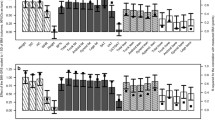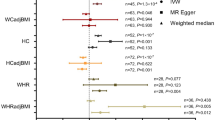Abstract
The effect of fat mass on bone mineral content (BMC) in children is not clear, particularly when considering a diverse population. Ancestral genetic admixture may be an approach to accurately identify population differences in BMC. Our objective was to evaluate the relationships between self-reported race/ethnicity, genetic admixture, and fat mass on BMC in a multiethnic sample of children (n = 270), taking into account dietary and physical activity variables. Ancestral genetic admixture was estimated using 140 ancestry informative markers, body composition by dual-energy X-ray absorptiometry, diet by 24-h recall, and physical activity by accelerometry. Multiple linear regression examined the relationships between race/ethnicity or genetic admixture and percent fat on BMC. Additional analyses were conducted to examine the relationship between race/ethnicity or genetic admixture and BMC stratified by body fat percentage cutpoints. In regression models, there was no association between race/ethnicity and BMC. In contrast, African admixture (AFADM) was positively associated with BMC, American Indian admixture (AMINADM) was inversely associated with BMC, and there was no association between European admixture (EUADM) and BMC. When stratified by percent fat group, high body fat percentage was inversely associated with BMC with EUADM and AMINADM (P = 0.03 and P = 0.02, respectively) and positively associated with AFADM (P < 0.001). Diet and physical activity were not related to BMC in this sample. Our findings suggest that genetic admixture and percent body fat, but not race/ethnicity, diet, or physical activity, influence BMC in our sample of peripubertal children. Further, there is a differential impact of percent fat on BMC that may be mediated by genetic admixture.


Similar content being viewed by others
References
Vicente-Rodriguez G (2006) How does exercise affect bone development during growth? Sports Med 36:561–569
Goulding A, Grant AM, Williams SM (2005) Bone and body composition of children and adolescents with repeated forearm fractures. J Bone Miner Res 20:2090–2096
Bachrach LK (2007) Consensus and controversy regarding osteoporosis in the pediatric population. Endocr Pract 13:513–520
Liu YJ, Shen H, Xiao P, Xiong DH, Li LH, Recker RR, Deng HW (2006) Molecular genetic studies of gene identification for osteoporosis: a 2004 update. J Bone Miner Res 21:1511–1535
Heaney RP, Abrams S, Lawson-Hughes B, Looker A, Marcus R, Matkovic V, Weaver C (2000) Peak bone mass. Osteoporos Int 11:985–1009
Bonjour JP, Theintz G, Buchs B, Slosman D, Rizzoli R (1991) Critical years and stages of puberty for spinal and femoral bone mass accumulation during adolescence. J Clin Endocrinol Metab 73:555–563
Martin AD, Bailey DA, McKay HA, Whiting S (1997) Bone mineral and calcium accretion during puberty. Am J Clin Nutr 66:611–615
Hill DD, Cauley JA, Bunker CH, Baker CE, Patrick AL, Beckles GL, Wheeler VW, Zmuda JM (2008) Correlates of bone mineral density among postmenopausal women of African Caribbean ancestry: Tobago women’s health study. Bone (NY) 43:156–161
Bonilla C, Shriver MD, Parra EJ, Jones A, Fernandez JR (2004) Ancestral proportions and their association with skin pigmentation and bone mineral density in Puerto Rican women from New York City. Hum Genet 115:57–68
Aloia JF (2008) African Americans, 25-hydroxyvitamin D, and osteoporosis: a paradox. Am J Clin Nutr 88:545S–550S
Bischoff-Ferrari HA, Willett WC, Wong JB, Giovannucci E, Dietrich T, Dawson-Hughes B (2005) Fracture prevention with vitamin D supplementation: a meta-analysis of randomized controlled trials. JAMA 293:2257–2264
Janz KF, Burns TL, Torner JC, Levy SM, Paulos R, Willing MC, Warren JJ (2001) Physical activity and bone measures in young children: the Iowa bone development study. Pediatrics 107:1387–1393
Petit MA, McKay HA, MacKelvie KJ, Heinonen A, Khan KM, Beck TJ (2002) A randomized school-based jumping intervention confers site and maturity-specific benefits on bone structural properties in girls: a hip structural analysis study. J Bone Miner Res 17:363–372
Sardinha LB, Baptista F, Ekelund U (2008) Objectively measured physical activity and bone strength in 9-year-old boys and girls. Pediatrics 122:e728–e736
Tobias JH, Steer CD, Mattocks CG, Riddoch C, Ness AR (2007) Habitual levels of physical activity influence bone mass in 11-year-old children from the United Kingdom: findings from a large population-based cohort. J Bone Miner Res 22:101–109
Vicente-Rodriguez G, Ezquerra J, Mesana MI, Fernandez-Alvira JM, Rey-Lopez JP, Casajus JA, Moreno LA (2008) Independent and combined effect of nutrition and exercise on bone mass development. J Bone Miner Metab 26:416–424
Afghani A, Goran MI (2006) Racial differences in the association of subcutaneous and visceral fat on bone mineral content in prepubertal children. Calcif Tissue Int 79:383–388
Di IN, Rosol M, Mittelman SD, Gilsanz V (2008) Reciprocal relation between marrow adiposity and the amount of bone in the axial and appendicular skeleton of young adults. J Clin Endocrinol Metab 93:2281–2286
Pollock NK, Laing EM, Baile CA, Hamrick MW, Hall DB, Lewis RD (2007) Is adiposity advantageous for bone strength? A peripheral quantitative computed tomography study in late adolescent females. Am J Clin Nutr 86:1530–1538
Marshall WA, Tanner JM (1969) Variations in pattern of pubertal changes in girls. Arch Dis Child 44:291–303
Marshall WA, Tanner JM (1970) Variations in the pattern of pubertal changes in boys. Arch Dis Child 45:13–23
Herman-Giddens ME, Slora EJ, Wasserman RC, Bourdony CJ, Bhapkar MV, Koch GG, Hasemeier CM (1997) Secondary sexual characteristics and menses in young girls seen in office practice: a study from the Pediatric Research in Office Settings network. Pediatrics 99:505–512
Coleman L, Coleman J (2002) The measurement of puberty: a review. J Adolesc 25:535–550
Malina RM, Bouchard C (1991) Growth, maturation, and physical activity. Human Kinetics Books, Champaign
Huffman DM, Landy NM, Potter E, Nagy TR, Gower BA (2005) Comparison of the Lunar DPX-L and Prodigy dual-energy X-ray absorptimeters for assessing total and regional body composition. Int J Body Compos Res 48:25–30
Myakishev MV, Khripin Y, Hu S, Hamer DH (2001) High-throughput SNP genotyping by allele-specific PCR with universal energy transfer labeled primers. Genome Res 11:163–169
Parra EJ, Marcini A, Akey J, Martinson J, Batzer MA, Cooper R, Forrester T, Allison DB, Deka R, Ferrell RE, Shriver MD (1998) Estimating African American admixture proportions by use of population-specific alleles. Am J Hum Genet 63:1839–1851
Hanis CL, Chakraborty R, Ferrell RE, Schull WJ (1986) Individual admixture estimates: disease associations and individual risk of diabetes and gallbladder disease among Mexican-Americans in Starr County, Texas. Am J Phys Anthropol 70:433–441
Cirino PT, Chin CE, Sevcik RA, Wolf M, Lovett M, Morris RD (2002) Measuring socioeconomic status: reliability and preliminary validity for different approaches. Assessment 9:145–155
Williams DP, Going SB, Lohman TG, Harsha DW, Srinivasan SR, Webber LS, Berenson GS (1992) Body fatness and risk for elevated blood pressure, total cholesterol, and serum lipoprotein ratios in children and adolescents. Am J Public Health 82:358–363
Weaver CM, McCabe LD, McCabe GP, Novotny R, Van LM, Going S, Matkovic V, Boushey C, Savaiano DA (2007) Bone mineral and predictors of bone mass in white, Hispanic, and Asian early pubertal girls. Calcif Tissue Int 81:352–363
Wosje KS, Khoury PR, Claytor RP, Copeland KA, Kalkwarf HJ, Daniels SR (2009) Adiposity and TV viewing are related to less bone accrual in young children. J Pediatr 154:79–85
Rocher E, Chappard C, Jaffre C, Benhamou CL, Courteix D (2008) Bone mineral density in prepubertal obese and control children: relation to body weight, lean mass, and fat mass. J Bone Miner Metab 26:73–78
Shaffer JR, Kammerer CM, Reich D, McDonald G, Patterson N, Goodpaster B, Bauer DC, Li J, Newman AB, Cauley JA, Harris TB, Tylavsky F, Ferrell RE, Zmuda JM (2007) Genetic markers for ancestry are correlated with body composition traits in older African Americans. Osteoporos Int 18:733–741
Gower BA, Fernandez JR, Beasley TM, Shriver MD, Goran MI (2003) Using genetic admixture to explain racial differences in insulin-related phenotypes. Diabetes 52:1047–1051
Lara-Castro C, Doud EC, Tapia PC, Munoz AJ, Fernandez JR, Hunter GR, Gower BA, Garvey WT (2008) Adiponectin multimers and metabolic syndrome traits: relative adiponectin resistance in African Americans. Obesity (Silver Spring) 16(12):2616–2623
Higgins PB, Fernandez JR, Goran MI, Gower BA (2005) Early ethnic difference in insulin-like growth factor-1 is associated with African genetic admixture. Pediatr Res 58:850–854
Brannon PM, Yetley EA, Bailey RL, Picciano MF (2008) Overview of the conference “Vitamin D and Health in the 21st Century: an Update”. Am J Clin Nutr 88:483S–490S
Cranney A, Weiler HA, O’Donnell S, Puil L (2008) Summary of evidence-based review on vitamin D efficacy and safety in relation to bone health. Am J Clin Nutr 88:513S–519S
Salamoun MM, Kizirian AS, Tannous RI, Nabulsi MM, Choucair MK, Deeb ME, El-Hajj Fuleihan GA (2005) Low calcium and vitamin D intake in healthy children and adolescents and their correlates. Eur J Clin Nutr 59:177–184
Pocock NA, Noakes KA, Griffiths M, Bhalerao N, Sambrook PN, Eisman JA, Freund J (1997) A comparison of longitudinal measurements in the spine and proximal femur using Lunar and Hologic instruments. J Bone Miner Res 12:2113–2118
Acknowledgments
This work was funded by R01 DK067426-01, M01 RR00032.
Conflict of interest statement
There are not any potential, perceived, or real conflicts of interests, especially any financial arrangements, to be disclosed by any of the authors of this manuscript.
Author information
Authors and Affiliations
Corresponding author
About this article
Cite this article
Casazza, K., Thomas, O., Dulin-Keita, A. et al. Adiposity and genetic admixture, but not race/ethnicity, influence bone mineral content in peripubertal children. J Bone Miner Metab 28, 424–432 (2010). https://doi.org/10.1007/s00774-009-0143-x
Received:
Accepted:
Published:
Issue Date:
DOI: https://doi.org/10.1007/s00774-009-0143-x




